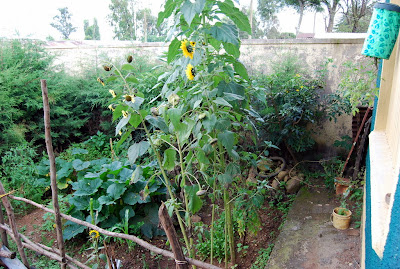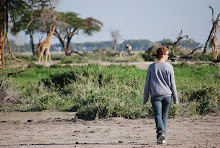My personal rule is that once Thanksgiving passes it’s fair game for Christmas music. So once we entered the holiday season my itunes has been blasting Christmas cheer to make it feel more like home. Considering that the weather is between 65-85 degrees most days, Ethiopian Christmas isn’t until January 7, and Ethiopian Christmas doesn’t typically involve trees, lights or decorations, I needed a lot of music to try to make up for the differences! A couple weeks ago while Kate, Emily and I were on our way to the pool in Bahir Dar and decided to play Christmas music on a speaker in the minibus for all to enjoy. Playing your personal music without earphones is quite normal, even expected, but I was surprised that no one turned to look at the foreigners as we sang our way to the pool. It helped us get a little more into the spirit of the season.
Last week the missionary family in Emily’s town invited us over for an early Christmas dinner at their house. Not sure what to expect for dinner, we were overjoyed by the smell of freshly baking bread and a very all-American meal laid out for us. Chicken, mashed potatoes, sweet potato casserole, cranberry jelly and freshly baked cookies! We all reminisced about Christmas pasts and enjoyed each other’s company in their comfortable home. After a while we sat around as their friend Sheryl played the guitar and we all sang Christmas carols. We were even able to hear a few traditional Christmas carols sung in Japanese by the jica volunteers!
Saturday I headed south to Addis Ababa where I was anxiously awaiting my boyfriend’s arrival from Europe. After the mess of winter weather had the final word, canceling his flight and rescheduling for three days later, I was blessed to have an offer to stay with friends Jess and Brian in Addis. Moreover, their friend was having a Mexican Christmas dinner and they invited me to join the festivities! I was also very grateful that other volunteers were in town to hang out with during the past couple days in Addis, trying to take my mind off of snow delays in Europe. As sad as I was to not have my boyfriend, Dominik, in town yet, it was wonderful to have gracious friends around helping me pass the time until his arrival.
When I arrived in Ethiopia in December 2008 I spent Christmas with my training group on a day trip to a nearby lake. Then Christmas 2009 I was in Bahir Dar with my family on vacation, and several Peace Corps volunteers. Finally I’m wrapping up service with one more Christmas, and the plan is for Dominik and me to meet up with other Peace Corps volunteers in Bahir Dar to celebrate together. It’s amazing how fast things are finishing up here, but I am trying to enjoy every moment I have left.
Merry Christmas to all!!
Last week the missionary family in Emily’s town invited us over for an early Christmas dinner at their house. Not sure what to expect for dinner, we were overjoyed by the smell of freshly baking bread and a very all-American meal laid out for us. Chicken, mashed potatoes, sweet potato casserole, cranberry jelly and freshly baked cookies! We all reminisced about Christmas pasts and enjoyed each other’s company in their comfortable home. After a while we sat around as their friend Sheryl played the guitar and we all sang Christmas carols. We were even able to hear a few traditional Christmas carols sung in Japanese by the jica volunteers!
Saturday I headed south to Addis Ababa where I was anxiously awaiting my boyfriend’s arrival from Europe. After the mess of winter weather had the final word, canceling his flight and rescheduling for three days later, I was blessed to have an offer to stay with friends Jess and Brian in Addis. Moreover, their friend was having a Mexican Christmas dinner and they invited me to join the festivities! I was also very grateful that other volunteers were in town to hang out with during the past couple days in Addis, trying to take my mind off of snow delays in Europe. As sad as I was to not have my boyfriend, Dominik, in town yet, it was wonderful to have gracious friends around helping me pass the time until his arrival.
When I arrived in Ethiopia in December 2008 I spent Christmas with my training group on a day trip to a nearby lake. Then Christmas 2009 I was in Bahir Dar with my family on vacation, and several Peace Corps volunteers. Finally I’m wrapping up service with one more Christmas, and the plan is for Dominik and me to meet up with other Peace Corps volunteers in Bahir Dar to celebrate together. It’s amazing how fast things are finishing up here, but I am trying to enjoy every moment I have left.
Merry Christmas to all!!

























































